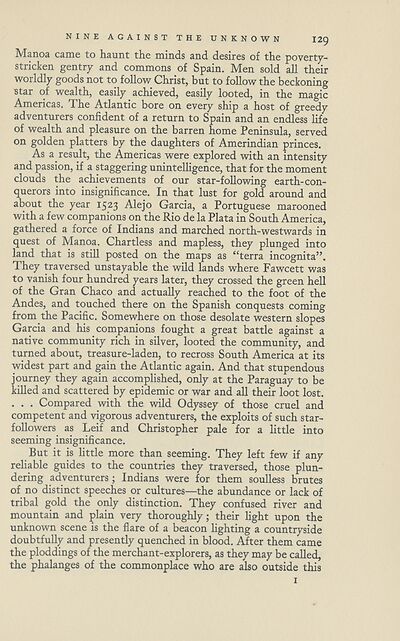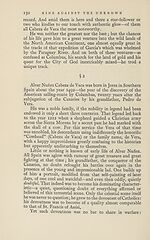Nine against the unknown
(149)
Download files
Complete book:
Individual page:
Thumbnail gallery: Grid view | List view

NINE AGAINST THE UNKNOWN I29
Manoa cam© to haunt the minds and desires of the poverty-
stricken gentry and commons of Spain. Men sold all their
worldly goods not to follow Christ, but to follow the beckoning
star of wealth, easily achieved, easily looted, in the magic
Americas. The Atlantic bore on every ship a host of greedy
adventurers confident of a return to Spain and an endless life
of wealth and pleasure on the barren home Peninsula, served
on golden platters by the daughters of Amerindian princes.
As a result, the Americas were explored with an intensity
and passion, if a staggering unintelligence, that for the moment
clouds the achievements of our star-following earth-con¬
querors into insignificance. In that lust for gold around and
about the year 1523 Alejo Garcia, a Portuguese marooned
with a few companions on the Rio de la Plata in South America,
gathered a force of Indians and marched north-westwards in
quest of Manoa. Chartless and mapless, they plunged into
land that is still posted on the maps as <cterra incognita”.
They traversed unstayable the wild lands where Fawcett was
to vanish four hundred years later, they crossed the green hell
of the Gran Chaco and actually reached to the foot of the
Andes, and touched there on the Spanish conquests coming
from the Pacific. Somewhere on those desolate western slopes
Garcia and his companions fought a great battle against a
native community rich in silver, looted the community, and
turned about, treasure-laden, to recross South America at its
widest part and gain the Atlantic again. And that stupendous
journey they again accomplished, only at the Paraguay to be
killed and scattered by epidemic or war and all their loot lost.
. . . Compared with the wild Odyssey of those cruel and
competent and vigorous adventurers, the exploits of such star-
followers as Leif and Christopher pale for a little into
seeming insignificance.
But it is little more than seeming. They left few if any
reliable guides to the countries they traversed, those plun¬
dering adventurers; Indians were for them soulless brutes
of no distinct speeches or cultures—the abundance or lack of
tribal gold the only distinction. They confused river and
mountain and plain very thoroughly; their light upon the
unknown scene is the flare of a beacon lighting a countryside
doubtfully and presently quenched in blood. After them came
the ploddings of the merchant-explorers, as they may be called,
the phalanges of the commonplace who are also outside this
Manoa cam© to haunt the minds and desires of the poverty-
stricken gentry and commons of Spain. Men sold all their
worldly goods not to follow Christ, but to follow the beckoning
star of wealth, easily achieved, easily looted, in the magic
Americas. The Atlantic bore on every ship a host of greedy
adventurers confident of a return to Spain and an endless life
of wealth and pleasure on the barren home Peninsula, served
on golden platters by the daughters of Amerindian princes.
As a result, the Americas were explored with an intensity
and passion, if a staggering unintelligence, that for the moment
clouds the achievements of our star-following earth-con¬
querors into insignificance. In that lust for gold around and
about the year 1523 Alejo Garcia, a Portuguese marooned
with a few companions on the Rio de la Plata in South America,
gathered a force of Indians and marched north-westwards in
quest of Manoa. Chartless and mapless, they plunged into
land that is still posted on the maps as <cterra incognita”.
They traversed unstayable the wild lands where Fawcett was
to vanish four hundred years later, they crossed the green hell
of the Gran Chaco and actually reached to the foot of the
Andes, and touched there on the Spanish conquests coming
from the Pacific. Somewhere on those desolate western slopes
Garcia and his companions fought a great battle against a
native community rich in silver, looted the community, and
turned about, treasure-laden, to recross South America at its
widest part and gain the Atlantic again. And that stupendous
journey they again accomplished, only at the Paraguay to be
killed and scattered by epidemic or war and all their loot lost.
. . . Compared with the wild Odyssey of those cruel and
competent and vigorous adventurers, the exploits of such star-
followers as Leif and Christopher pale for a little into
seeming insignificance.
But it is little more than seeming. They left few if any
reliable guides to the countries they traversed, those plun¬
dering adventurers; Indians were for them soulless brutes
of no distinct speeches or cultures—the abundance or lack of
tribal gold the only distinction. They confused river and
mountain and plain very thoroughly; their light upon the
unknown scene is the flare of a beacon lighting a countryside
doubtfully and presently quenched in blood. After them came
the ploddings of the merchant-explorers, as they may be called,
the phalanges of the commonplace who are also outside this
Set display mode to:
![]() Universal Viewer |
Universal Viewer | ![]() Mirador |
Large image | Transcription
Mirador |
Large image | Transcription
Images and transcriptions on this page, including medium image downloads, may be used under the Creative Commons Attribution 4.0 International Licence unless otherwise stated. ![]()
| The books of Lewis Grassic Gibbon > Nine against the unknown > (149) |
|---|
| Permanent URL | https://digital.nls.uk/205219879 |
|---|
| Description | Sixteen books written by Lewis Grassic Gibbon (1901-1935), regarded as the most important Scottish prose writer of the early 20th century. All were published in the last seven years of his life, mostly under his real name, James Leslie Mitchell. They include two works of science fiction, non-fiction works on exploration, short stories set in Egypt, a novel about Spartacus, and the classic 'Scots Quair' trilogy which includes 'Sunset Song'. Mitchell's first book 'Hanno, or the future of exploration' (1928) is rare and has never been republished. |
|---|---|
| Additional NLS resources: |
|

